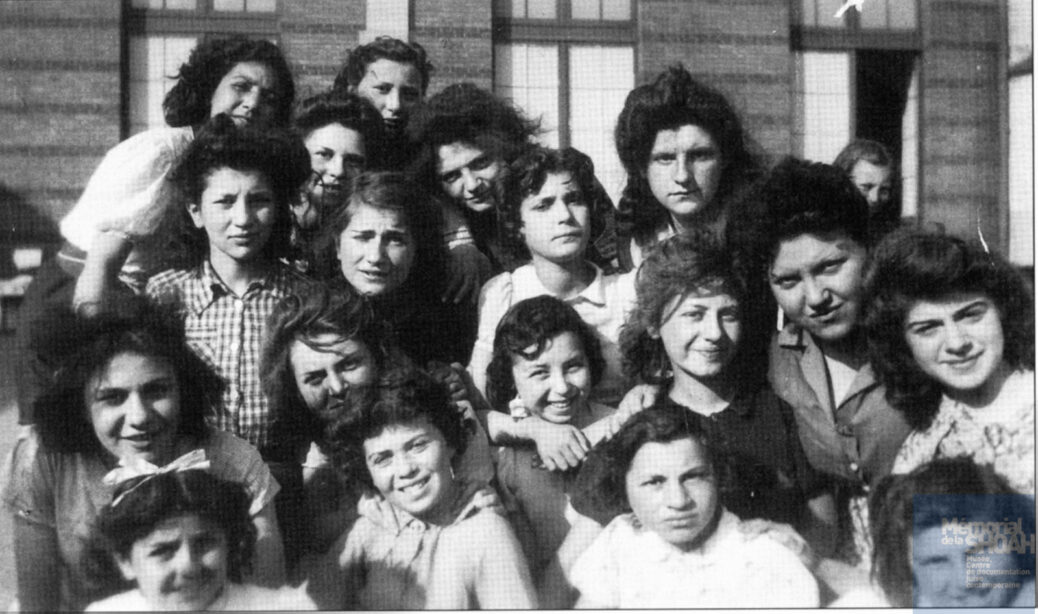Rosa KALINSKY
Rosa Kalinsky was born on March 7, 1936, in Nancy, in Eastern France. Rosa came from a Jewish family with both Polish and German roots. Her father, Maurice Kalinsky, a hairdresser from Germany, was born in Cologne on April 10, 1905, and her mother, Baila Kalinsky, a housewife, was born in Lask in Poland on August 17, 1908.
Both parents were arrested in October 1942 and deported to Auschwitz on Convoy 42, when the Final Solution was put into effect. They left behind their four daughters, as Rosa had three sisters, Renée who was born on July 6, 1927, Estelle who was born on April 19, 1930, and Sylvia, who was born on September 29, 1939. Less than a year after their parents’ deportation, the Kalinsky sisters were taken to a children’s home run by the UGIF (Union Générale des Israélites de France, or General Union of French Jews). The UGIF was a Jewish organization set up to provide assistance, welfare and social services. The prefectures and the Gestapo made it compulsory for all Jews to join the U.G.I.F, and at the same time all pre-existing Jewish organizations were closed down. The U.G.I.F. ran its own children’s homes, the first of which were founded at the time of the Vel d’Hiv round-up on July 16 and 17, 1942. Children who were “liberated” from the camps at Drancy, Pithiviers, Beaune-la Rolande and Poitiers had to be placed in U.G.I.F. homes. Estelle was one of these so-called “blocked” children, entrusted to the U.G.I.F. Blocked children’s names were listed in a special police register, and these particular “liberations” were, in reality, a sham. Such children could only be sent to UGIF homes, it was the German authorities who decided where to place them, and they and the Vichy regime kept strict control over them. They were thus assigned to the various UGIF homes: Louveciennes, the Rothschild orphanage, the Zysman boarding house in La Varenne, Saint-Mandé, Neuilly, rue Vauquelin and the vocational school on rue des Rosiers in Paris, and in Montreuil.
Rosa Kalinsky and her sisters were sent to live at the children’s center on rue des Rosiers, in Louveciennes. The photo was taken in the orphanage courtyard, and shows Rosa in the front row on the left. It was there that they met Denise Holstein, a supervisor they came to regard as their nanny. They were transferred to the Lamarck center, at 70 avenue Secrétan in the 19th district of Paris, in April 1944. Their room was on the third floor, off staircase six.
Aloïs Brunner, the commandant of Drancy camp, issued the order for a series of roundups of all the UGIF homes for Jewish children, in retaliation for the failed attempt on Hitler’s life on July 20, 1944, and for various Resistance operations in France. On the night of July 21-22, 1944, the Gestapo carried out a sweep of the U.G.I.F. children’s homes, which housed the children of French Jews, most of whom had already been deported and murdered, and some foreign Jewish children. During this crackdown, eight children’s homes were raided, and both residents and staff were taken prisoner and subsequently deported. More than three hundred innocent children were arrested that night. The children in the Louveciennes home were woken up at dawn and told to get out of bed and to wait for the Gestapo cars. Rosa, Estelle and Renée Kalinsky were taken to Drancy internment camp; only Sylvia Kalinsky escaped deportation. Born on September 26, 1939, Sylvia was adopted while she was staying at one of the UGIF homes, and thus escaped the atrocities. Rosa and her two other sisters were deported on Convoy 77 on July 31, 1944. Together with all the other Jews, they were taken to Bobigny railroad station, from where they were deported to Auschwitz. They were murdered in the gas chambers at Auschwitz soon after they arrived. Little Rosa was just eight years old. Rosa Kalinsky was later officially declared to have died on August 5, 1944. However, this is not the actual date on which she died. The French authorities used the same date for all of the people who were deported on Convoy 77 and were not selected to go into the camp to work. They were therefore deemed to have died on arrival at Auschwitz.


 Français
Français Polski
Polski








